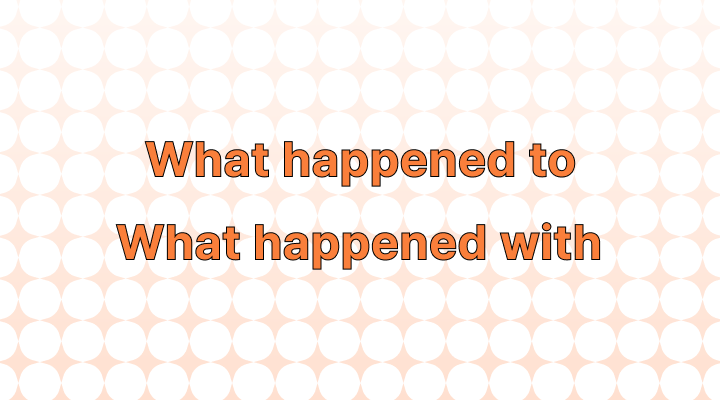- The phrase "What happened to" is commonly used to inquire about the outcome or fate of a person or thing. It invites an explanation of events or circumstances that led to a particular state or situation.
- "What happened with" is employed when seeking information about the events or actions that occurred in a given situation. It implies a broader inquiry into the series of occurrences or circumstances associated with a particular event.
Example:
- "What happened to your car after the accident?"
Here, the focus is on the aftermath of the accident, prompting the listener to provide details about the condition or fate of the car.
Example:
- "Can you tell me what happened with the project deadline?"
In this instance, the speaker is interested in understanding the sequence of events or circumstances that led to the project's outcome or status.

What does "what happened" mean?
The phrase "what happened?" is an inquiry seeking information about a specific event or situation. It is often used when someone wants an explanation, details, or a narrative about something that occurred. The question is broad and open-ended, inviting the responder to provide context, describe the sequence of events, or share information about a particular incident.
For example:
- If someone arrives late to a meeting, you might ask, "What happened?" to understand the reason for their delay.
- If a friend seems upset, you might inquire, "What happened?" to express concern and gather information about the source of their distress.
- In a news context, a journalist might ask witnesses, "What happened?" to report on an incident or accident.
Choosing the Right Phrase:
What happened to?
- What happened to" emphasizes the result or state.
- Use "What happened to" for outcomes or consequences.
Example sentence:
"What happened to the vase after it fell off the shelf?"
Examples from the web:
"What happened to humanity?" - Independent
"... Fiddling with her jewelry in an absent-minded way, Das mused, "What happened to patience?What happened to love? I am tired of fighting". ..." - The New Yorker
"... Fifty games?What happened to 100? When a fugitive skips town, shouldn't the same punishment apply if he tries to come back? ..." - The New York Times - Sports
What happened with?
- "What happened with" focuses on the events or circumstances.
- Use "What happened with" for a broader inquiry into events.
Example sentence:
"Can you explain what happened with the negotiations?"
Examples from the web:
"... You were going to design a collection of furniture a few years back.What happened with that? One of the reasons is you have to know a little bit more than just venturing out. ..." - The New York Times
"What happened with the negotiations in Delhi?" - The New York Times
"What happened with my brother's wedding?" - The New York Times - Travel
Conclusion
In the intricate landscape of language, choosing between "What happened to" and "What happened with" involves subtle considerations of focus and intention. These phrases are versatile tools that enable us to seek specific information and gain a deeper understanding of the events and outcomes we inquire about. By navigating these nuances, we enhance our ability to communicate effectively and with precision.
Want to sound like a native speaker?
Engram’s AI-powered grammar checker makes your English sound like a native speaker’s, suggesting natural English expressions on top of fixing grammar, spelling, punctuation, word order, and vocabulary.

References:














